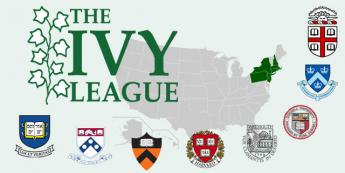Related Topics
Whither, Federal Reserve? (1) Before Our Crash
The Federal Reserve seems to be a big black box, containing magic. In fact, its high-wire acrobatics must not be allowed to fail. Nevertheless, it may be time to consider revising or replacing it.
Academia in the Philadelphia Region
Higher education is a source of pride, progress, and aggravation.
Philadelphia Economics
economics
Conventions and Convention Centers
When you have a big convention center, some circus is always coming to town. Philadelphia has always been a convention town, has had and still has lots of convention sites, and hopes to have more of the kind of famous convention we have had in the past.
Indigents
With a long history of welcoming and assisting the poor, Philadelphia has always risked swamping the lifeboat by attracting more of them than it can handle.
No Laborer Left Behind
 |
| Ivy League |
The top thirty American colleges have ten times the applicants they have room for. Demand vastly exceeds supply, prices are essentially fixed; shortages result. Can-do is the American way, so our first reaction is to build a lot more colleges and beat them over the head if they aren't first-rate. To bring this down to a local scale, implications are that Philadelphia has a moral duty to build eighteen more Ivy-League universities.
 |
| Cosa Ricians Roofers |
Let's think about that, in a back-of-the envelope way. Since the rest of the country is going to be similarly driven, we can't attract Americans to run those universities. Philadelphians who are doing other things must staff those universities; people inclined to become professionals of a different sort are going to have to be trained to be university professors. Students now being rejected will be admitted, since that's the purpose of the thing. Unless we somehow increase academic productivity, every man, woman and child from Trenton to Wilmington is going to be in a college classroom in some capacity or other. We here confront the extrapolation fallacy; a new problem must be addressed in more productive ways than just more of the same.
Curiously, the readjustments to this overall shift from an industrial to a service economy are first making their appearance in things like roof repairs and ironing shirts. When my house needed a new roof, I found I had a choice of workgangs composed of Costa Rican, Puerto Rican, or Polish roofers. The Costa Ricans made the best bid and went to work immediately. They started pounding on my roof at 6 AM, and we're still pounding after I went to bed at night; I have grave doubts that American roofers would approach that work standard. I am told that the entire building industry, on which our current prosperity rests, would collapse if we banned illegal immigration. In a different industry, Philadelphia's convention hall cannot attract visitors unless we build more hotels. But the hotel industry cannot find nearly enough people who speak English to make the beds. For one purpose or another, we have imported 12 million illegal immigrants who mostly remain invisible because they are so hard at work.
We are going too recklessly fast with what is fundamentally a useful transformation of our society. Americans want to go to college because statistics show that will make them prosper. But that's only half of their transformation. The other half is a resulting shortage of labor in the jobs which do not require college. Normally, you would expect wages to rise, but they are suppressed -- deflated -- by substituting immigrant labor, legal and illegal. Impose an effective barrier to immigrants, and you would quickly see inflation like you wouldn't believe. Combat inflation by raising interest rates and the housing market would quickly collapse. That would prove to be a painful way to make the immigrants decide to go back home, although it would be effective. And so on, and so on, and so on.
Slow down, America. You're going in the right direction, but exceeding the speed limit.
Originally published: Sunday, June 03, 2007; most-recently modified: Sunday, July 21, 2019